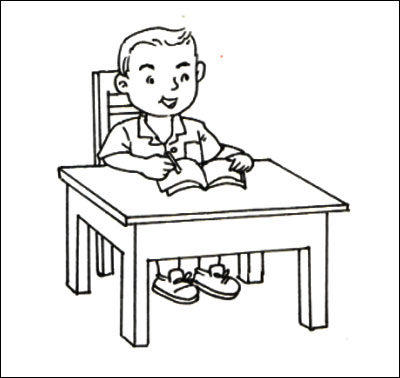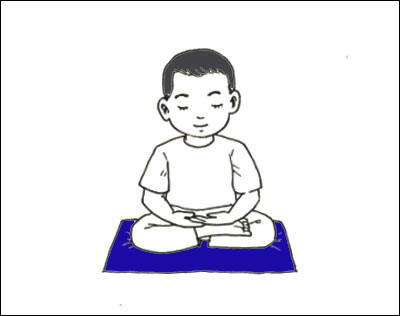MeditationMeditation for BeginnersHow To Build The Habits Of The ChildrenTo Be Sincere And Clever (Mai Ngo)#6Education either in the reality or in the Dhamma consists of 4 factors.Why Are We Clever If We Respect Education?Education either in the reality or in the Dhamma consists of 4 factors. The parents must know that the wisdom of their children comes from 4 factors:1) having good people as teachers.2) Listening to teachers.3) Thinking along with the teachers’ words.4) Behaving as per the teachers’ instructions.The first factor relates to the quality of the teachers. The other 3 relate to the respect for education of the students.Without these 4 factors, it’s hard for children to be intelligent. For example, if children have a good teacher, they don’t know how to respect the teacher as should be trained by the parents. They will not listen to the teacher, they will not think about the teacher’s words, and they will not behave according to the teacher’s instructions. They will not get the knowledge as much as they should even if they have the best teacher is the world.It can be compared to using a small and narrow necked bottle to fill with with rain that is raining down heavily from the sky. There is so much rain for us to collect but we just can’t get the water into the bottle because the neck is too narrow to allow the water to stream in.On the other hand, if children have a bad teacher, even though your children respect the teacher, the children know how to think cleverly and perform duties with concentration. With all the intelligence they have they will not be able to extract any good from this type of teacher to use in their own life.Therefore, children will be good and smart when they have good teachers and learn to respect their teachers well.What Qualities Must Good Teachers Have In Order To Train Children To Learn respect?1) Teachers must command respect because they impart knowledge to the students.2) Teachers must supply textbooks because they are instruments to help in the education process, to be more convenient, and they are easy to review.3) Teachers must have education as a priority because it leads to showing respect to teachers and encourages the students not to look down on education.4) Teachers must teach the students self – respect because we have a duty to be good students and teach ourselves to be good people.Parents have to teach children to respect these 4 factors so they will have wisdom.However, it’s hard for a good teacher to take care of 30 students in a classroom individually.So parents have to have a role in helping the teacher, too. After work, parents should help children to read and review homework everyday. That will make the children want to study, and read and write and to know that everyone pays attention to education. Then they will be enthusiastic and focus on their education as well because they see the parents are still studying.
Why We Should Meditate Faithfully To Increase Intelligence (Mai Ngo)Why We Should Meditate Faithfully To Increase Intelligence (Mai Ngo)Meditatin (Samadhi) is a major instruction from the Lord Buddha, which involves the concentration of your mind. That means that the actions of your mind have the sum total of your thoughts and your emotions together. When you have concentration you are not irritable and you do not get influenced by external stimulations. The external stimulations can cloud your mind by pervading it. It can make you uncomfortable give you a bad mood and lead you to wrong decision – making, an inability to study well and could lead to the making of many mistakes at your job etc.Respecting meditation means practicing meditation everyday, in order to stabilize your mind, be rational, have good emotions, be good at studying, memorizing, and for working effectively without thinking of anything else.A meditative mind is compared to using a magnifying glass to combine all the widespread sunlight to become a powerful spotlight. It builds up the hot energy to burn out the material to make a fire. Then the mind with meditation becomes the same thing. A meditative mind can also stop the mind, which worries about many things, and create the ability to focus on only one. In Buddhism, there are 40 ways of meditation.A person with a meditative mind will be able to handle the pressure better when they have to face any problems. They will not be easily stressed and nervous with troubles. Yet, they will be able to solve any problems correctly and easily.If parents train children to meditate from a very early age, they’ll have stable emotions, good memory, rationality, and will not be short-tempered. They will be able to teach themselves, and they will be able to think with sound judgment. They will grow up to be successful adults. They will handle responsibility well and will be able to face the whole wide world with security and confidence, the way that the parents want their children to be.The easy way to train children to meditate is to start them meditating for 5 minutes before going to bed every night. Then they should repeat it again in the morning everyday until it becomes their habit.An easy way to meditated is to close your eyes and focus on thinking “Bud-dho, Bud-dho, Bud-dho” and so on until the mind can follow through for 5 minutes. Or it can be done without thinking of anything as well. Just like that the mind will be led to its natural origin, which is at the middle of the abdomen. Then let it be calm and stabilized, which is its nature without being forced. This is an easy way to train one in meditation in the Buddhist tradition, and to train a quiet stable mind in children.Besides that, parents should teach children to do meditation for sharing merits (*Sut-tung-lie-tee-pen-pern-took-gurt-geh-jeb-tie-duay-gun-mo-tung-sin,Jong-pen-sook-pen-sook-tuhd-yah-dai-mee-wane-daw- gun-lae-gun-luy.Jong-pen-sook-pen-sook-tuhd-yah-dai-beaud-beaun-sung-gan-lae-gun-luy.Jong-pen-sook-pen-sook-tuhd-yai-dai-mee-kwam-took-guy-took-jai-luy.Jong-mee-kwam-suk-gai-suk-gai-suk-jai-rak-sah-dtone-hai-pone-jak-took-phai-tung-sin-tern.”The English translation of the metta/dana prayer is:All the animals that are born in this world are the friends of suffering for birth, old age, illness and death that we are all in together in the cycles of existence.Be happy in happiness and don’t join in kamma together.Be happy in happiness, and don’t exploit each other.Be happy in happiness, and don’t have body suffering, and mind suffering, and mind suffering, but be happy physically, with a happy mind and take care of yourself to erase all suffering.Only this prayer will make the childrens’ minds very pure, and very soft. If you train the children to share the merits like this regularly, not only will you train them for meditation but you also plant the seeds in the mind for the children to have metta (loving-kindness) and karuna (kindness) to all of the animals, all the humans and all of their human friends. They will not have wicked minds, and the children will look at the world to not destroy it, but will look at the world as a creation.In summary, if parents would like their children to have meditation minds, they will be able to teach them to have a good memory, to be happy, to be talented, to be rational, and to be responsible. Parents should train them to do meditation everyday until it becomes their habit." /> " /> " /> " /> " /> " /> " /> " /> " /> " /> " />
How To Build The Habits Of The Children To Be Sincere And Clever (Mai Ngo)#6
[ 13 ธ.ค. 2554 ] - [ 18256 ]







